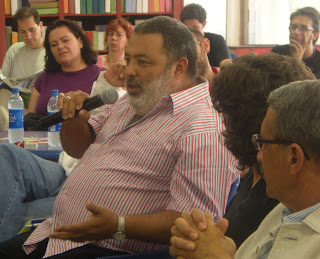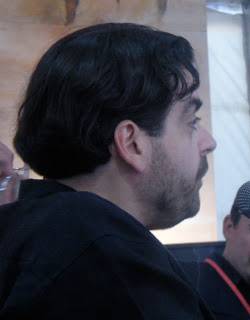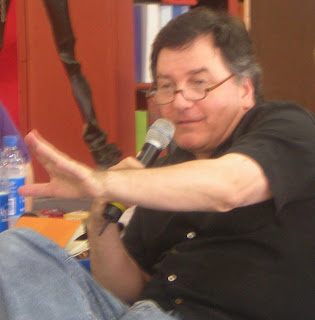 |
Release Date: March 31st, 2011, UK
Age Group: Adult
Publisher: MacLehose Press
Categories: Romance, Time-Travel, Historic Fiction, Contemporary
Read in May 2011
Summary from Goodreads:
One snowy night in New York City, a successful, solitary goldsmith reflects on his life, and his unrealiable memories intertwine and collide. Journeying to the village in Spain where he grew up, he hopes with some trepidation that he will encounter Celia, "the Black Widow", a beautiful and mysterious friend of his mother with whom he had a short and passionate affair when he was a teenager. But instead he meets a young woman who opens doors into an unimagined world, and takes him back in time.
The Goldsmith's Secret is a remarkable story of a love trapped between two parallel times, set in Spain in the 1950's, 1970's and in the last year of the twentieth century.
In beautifully economical prose, and with a structure as intricate and refined as a bevelled jewel, The Goldsmith's Secret is alight with intense nostalgia, memories and desires.
Elia Barceló has come to be recognized across Europe as a truly original voice, and her books as poetic works of great subtlety.
Blog: La Bloga (Login to Add to MyJacketFlap)
JacketFlap tags: horror, 2008, Semana Negra, Paco Taibo, Gijón, Thania Muñoz, crime fiction, España, tertulias, Juan Ramón Biedma, Rafael Marín, Roberto Ampuero, Elia Barceló, Add a tag

Exclusive reports from Crime Fiction's international big-bash by our roving reporter.
I've been looking for a word to correctly translate “tertulias.” Since unfortunately I didn’t bring my big and thick Oxford dictionary with me, I relied on wordreference.com. The definition it gives doesn’t transmit the same meaning to me, but then again, I think about all the translations in the world, from the classics of literature to Latin American literature translated into English, and I convince myself and say "don’t be so stupid, translations are not that bad."
So, according to my online translator tertulias are: literary gatherings, and I’m sticking to that term. At La Semana Negra, every day at five, there are tertulias where the invited writers discuss a topic. It’s an hour-long debate where they give their own opinions and even get into arguments with the other writers.
The first three literary gatherings where dedicated to the “monsters” of literature or film. The panel included Mexican writer, Miguel Cane, Spanish writers, Elia Barceló, Cristina Macía, Rafael Marín, Daniel Mares, Marc R. Soto, Victor Condé, Federico Fernández Giordano, Rodolfo Martínez, Juan Miguel Aguilera, Eduardo Angulo and Manuel Nonídez.
Right off the bat, the debate heated up. Some said Mr. Hyde is the worst monster of all time; others thought it was zombies and of course the always scary vampires. Although the list of monsters was very long, Mr. Hyde took the prize. Rafael Marín took the discussion to another level by saying Mr. Hyde scares us because he demonstrates that “we could be monsters, too.”
After that “Alien” made an appearance in the discussion and writer Elia Barceló defended him, affirming that “the only thing Alien is trying to do is defend himself.” Some agreed, some didn’t, but what made the literary gatherings more interesting was the great number of people listening to this conversation full of some very nerdy details on movies and books.
Although at the beginning in the “Carpa del encuentro”, Semana Negra's main tent, there weren’t many people, as time went by more slowly started coming. I would look around at the puzzled faces: some were ready to get up and say something, and others nodded when they agreed with what one of the writers said.
The guys next to me confided in me (I think because I was taking notes the whole time), “Yeah, I know it’s so cool to find out that you are not the only one that talks endlessly about these things.” These tertulias bring people closer to the writers so they have the opportunity to get to know them in a more personal way. After the debates are over, you see spectators coming up to the writers, saying they agreed with what they were saying, that the other writers were wrong, or something of the sort.
After the “monsters” tertulias, the next two followed the theme entitled “El mal y sus protagonistas” (wordreference.com again: “Evil and its main characters"). This time it was Paco Ignacio Taibo, II, the Cuban Lorenzo Lunar, Colombians Mario Mendoza and Nahum Montt, Mexican writer Eduardo Monteverde, the Chilean Roberto Ampuero, the Chicano Rolando Hinojosa, and Spaniards Ángel Tomás González, Kama Gutier, Juan Ramón Biedma and Achy Obejas. 
This tertulia focused on evil in these writers' own literature, why they write detective fiction, hardboiled, gothic and such, summarizing why their characters or stories are in some way evil. Juan Ramón Biedma at one point, firmly and passionately said, “Because good characters are boring.”
Simple and clear as that, but Roberto Ampuero, the Chilean writer who teaches at the University of Iowa, said “I live in a country (USA) that is constantly trying to separate good from evil, and of course George W. Bush is always saying that we are good, but it’s a lie and it makes no sense.  That’s something that intrigues me--why people are always trying to differentiate good from evil, if in reality we are both.” The debate continued on that note, and most of the writers agreed evil is very ambiguous and that we all have the possibility of being the hero or villain, because evil is something within us, something natural.
That’s something that intrigues me--why people are always trying to differentiate good from evil, if in reality we are both.” The debate continued on that note, and most of the writers agreed evil is very ambiguous and that we all have the possibility of being the hero or villain, because evil is something within us, something natural.
I don’t want to scare anybody--I know Vampires and Mr. Hyde are not the prettiest things--but I definitely wanted La Bloga readers to know what topics are discussed at La Semana Negra and to make sure everyone gets a feel of the types of discussion that happen here. But not only that; I also wanted to pass on the excitement and happiness that people who attend this gathering feel.
I’m sure some of you reading this will love hearing your favorite writer talk about his horror characters or why they write the way they do and how they build their characters. It’s a special thing and the spectators certainly recognize this, because during the discussions, they didn’t stop taking photos and notes. As someone behind me said, “I’m posting this on my blog.”
Saludos desde Gijón!
Thania Muñoz
Blog: OUPblog (Login to Add to MyJacketFlap)
JacketFlap tags: trib, salim, checkup, unequal, cn13, insipient, incipient, A-Featured, Lexicography, Dictionaries, Add a tag
Insipient writers often throw in big words like insipient/incipient at incipient stages of their careers. Say that five times fast! To learn how to use these words properly keep reading. If you liked this usage tip check out Garner’s Modern American Usage. To subscribe to his daily tips click here.
incipient; insipient.
The former means “beginning, in an initial stage”; the latter is an obsolete word meaning “unwise, foolish.” But “incipient” is often misspelled with an “-s-” — e.g.: (more…)



Thania, thanks for taking notes at the tertulia about evil characters. The authors' combined definitions of monsterism has given me the key to unlock a mystery about one of the characters in my new novel: he is an evil ex-boxer-veterano-pachuco. He is insensitive, detached, narcissistic, cold-blooded and a hardboiled monster. He's Mr. Hyde alright, El Pachuco Malo de Boyle Heights trapped in the era of film noir. I hadn't realized this until you made the connection for me at La Semana Negra, Muchas Gracias!
nlf
Thania,
Thank you for taking these notes at La Semana Negra. I am sure that there are so many activities going on that you cannot cover all of them, but what you post everyday is just perfect to give us an idea of what is going on there. As you know, literature is not my forte, but I can tell you that I read the book where Mr. Hyde comes out and I was shocked when the book reveals the identity of Mr. Hyde. As the writers mentioned in their tertulia, it is in our nature to be both good and evil at the same time. Those trying to identify the evil and eradicate it most of the time end up being the evil without noticing it. Saludos.
cHaNgUiTo
Wow!! I'm so thankful for the comments
I have a lot of notes, that I'll type up when I'm back, so please email me if you are interested
[email protected]
Norma, I cant believe my notes helped you so much, I feel amazing. By the way, a pachuco malo de boyle heights sounds extremely interesting!!!!
saludos!
Corrections, my friend and amazing cuban writer Rodolfo Perez Valero kindly corrected me on something. It turns out writers Ángel Tomás González and Achy Obejas, are Cubans, not Spanish. Sorry, a big mistake and I apologize!